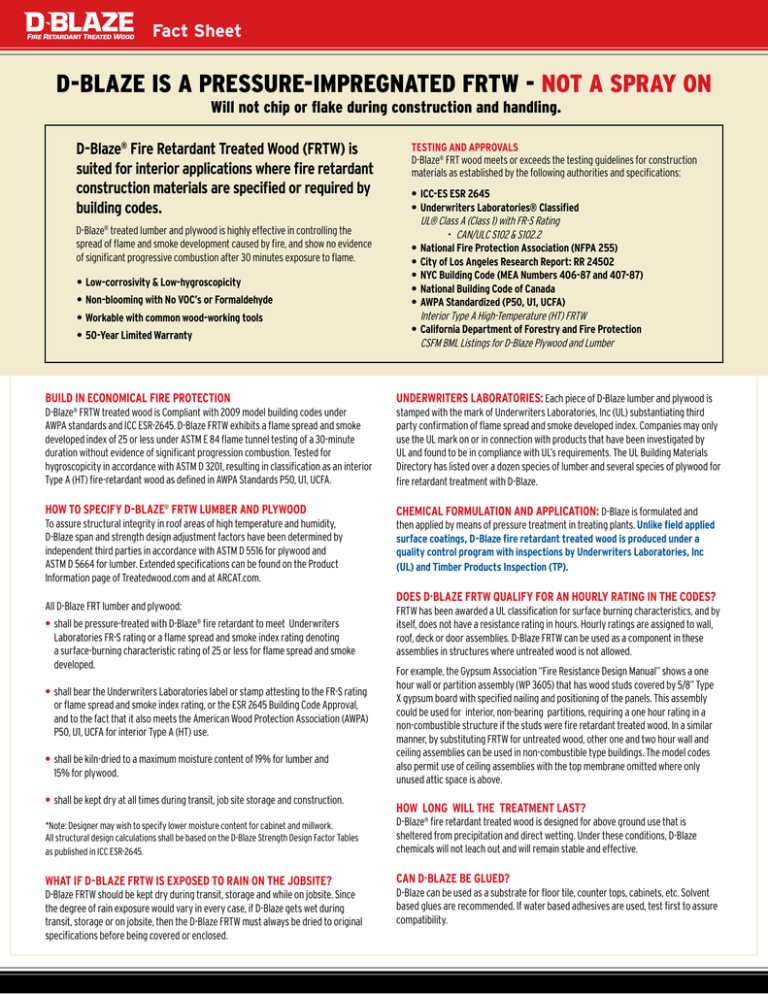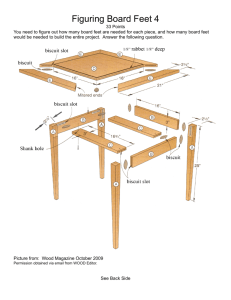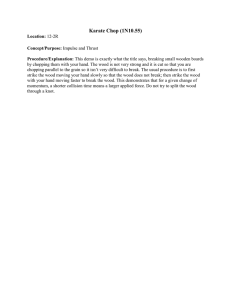
Fact Sheet
D-BLAZE IS A PRESSURE-IMPREGNATED FRTW - NOT A SPRAY ON
Will not chip or flake during construction and handling.
D-Blaze® Fire Retardant Treated Wood (FRTW) is
suited for interior applications where fire retardant
construction materials are specified or required by
building codes.
D-Blaze® treated lumber and plywood is highly effective in controlling the
spread of flame and smoke development caused by fire, and show no evidence
of significant progressive combustion after 30 minutes exposure to flame.
• Low-corrosivity & Low-hygroscopicity
• Non-blooming with No VOC’s or Formaldehyde
• Workable with common wood-working tools
• 50-Year Limited Warranty
TESTING AND APPROVALS
D-Blaze® FRT wood meets or exceeds the testing guidelines for construction
materials as established by the following authorities and specifications:
• ICC-ES ESR 2645
• Underwriters Laboratories® Classified
UL® Class A (Class 1) with FR-S Rating
• CAN/ULC S102 & S102.2
• National Fire Protection Association (NFPA 255)
• City of Los Angeles Research Report: RR 24502
• NYC Building Code (MEA Numbers 406-87 and 407-87)
• National Building Code of Canada
• AWPA Standardized (P50, U1, UCFA)
Interior Type A High-Temperature (HT) FRTW
• California Department of Forestry and Fire Protection
CSFM BML Listings for D-Blaze Plywood and Lumber
BUILD IN ECONOMICAL FIRE PROTECTION
UNDERWRITERS LABORATORIES: Each piece of D-Blaze lumber and plywood is
D-Blaze® FRTW treated wood is Compliant with 2009 model building codes under
AWPA standards and ICC ESR-2645. D-Blaze FRTW exhibits a flame spread and smoke
developed index of 25 or less under ASTM E 84 flame tunnel testing of a 30-minute
duration without evidence of significant progression combustion. Tested for
hygroscopicity in accordance with ASTM D 3201, resulting in classification as an interior
Type A (HT) fire-retardant wood as defined in AWPA Standards P50, U1, UCFA.
stamped with the mark of Underwriters Laboratories, Inc (UL) substantiating third
party confirmation of flame spread and smoke developed index. Companies may only
use the UL mark on or in connection with products that have been investigated by
UL and found to be in compliance with UL’s requirements. The UL Building Materials
Directory has listed over a dozen species of lumber and several species of plywood for
fire retardant treatment with D-Blaze.
HOW TO SPECIFY D-BLAZE® FRTW LUMBER AND PLYWOOD
CHEMICAL FORMULATION AND APPLICATION: D-Blaze is formulated and
To assure structural integrity in roof areas of high temperature and humidity,
D-Blaze span and strength design adjustment factors have been determined by
independent third parties in accordance with ASTM D 5516 for plywood and
ASTM D 5664 for lumber. Extended specifications can be found on the Product
Information page of Treatedwood.com and at ARCAT.com. All D-Blaze FRT lumber and plywood:
• shall be pressure-treated with D-Blaze® fire retardant to meet Underwriters
Laboratories FR-S rating or a flame spread and smoke index rating denoting
a surface-burning characteristic rating of 25 or less for flame spread and smoke
developed.
• shall bear the Underwriters Laboratories label or stamp attesting to the FR-S rating
or flame spread and smoke index rating, or the ESR 2645 Building Code Approval,
and to the fact that it also meets the American Wood Protection Association (AWPA)
P50, U1, UCFA for interior Type A (HT) use.
• shall be kiln-dried to a maximum moisture content of 19% for lumber and
15% for plywood.
• shall be kept dry at all times during transit, job site storage and construction.
then applied by means of pressure treatment in treating plants. Unlike field applied
surface coatings, D-Blaze fire retardant treated wood is produced under a
quality control program with inspections by Underwriters Laboratories, Inc
(UL) and Timber Products Inspection (TP).
DOES D·BLAZE FRTW QUALIFY FOR AN HOURLY RATING IN THE CODES?
FRTW has been awarded a UL classification for surface burning characteristics, and by
itself, does not have a resistance rating in hours. Hourly ratings are assigned to wall,
roof, deck or door assemblies. D-Blaze FRTW can be used as a component in these
assemblies in structures where untreated wood is not allowed.
For example, the Gypsum Association “Fire Resistance Design Manual” shows a one
hour wall or partition assembly (WP 3605) that has wood studs covered by 5/8” Type
X gypsum board with specified nailing and positioning of the panels. This assembly
could be used for interior, non-bearing partitions, requiring a one hour rating in a
non-combustible structure if the studs were fire retardant treated wood. In a similar
manner, by substituting FRTW for untreated wood, other one and two hour wall and
ceiling assemblies can be used in non-combustible type buildings. The model codes
also permit use of ceiling assemblies with the top membrane omitted where only
unused attic space is above.
HOW LONG WILL THE TREATMENT LAST?
*Note: Designer may wish to specify lower moisture content for cabinet and millwork.
All structural design calculations shall be based on the D-Blaze Strength Design Factor Tables
as published in ICC ESR-2645. D-Blaze® fire retardant treated wood is designed for above ground use that is
sheltered from precipitation and direct wetting. Under these conditions, D-Blaze
chemicals will not leach out and will remain stable and effective.
WHAT IF D-BLAZE FRTW IS EXPOSED TO RAIN ON THE JOBSITE?
CAN D·BLAZE BE GLUED?
D-Blaze FRTW should be kept dry during transit, storage and while on jobsite. Since
the degree of rain exposure would vary in every case, if D-Blaze gets wet during
transit, storage or on jobsite, then the D-Blaze FRTW must always be dried to original
specifications before being covered or enclosed.
D-Blaze can be used as a substrate for floor tile, counter tops, cabinets, etc. Solvent
based glues are recommended. If water based adhesives are used, test first to assure
compatibility.
Fact Sheet
CAN HOURLY RATED WOOD ROOF TRUSS ASSEMBLIES
USE D·BLAZE FRTW?
Testing has provided effective and competitive designs for one hour rated floor/
ceiling and roof/ceiling metal plate connected wood trusses. Unlike earlier designs,
the one hour rating can now be achieved with only one layer of 5/8” Type C gypsum
wallboard applied directly to the bottom chord of the truss. Various types of blocking
and connectors are used in these constructions developed by the Truss Plate Institute
and several independent companies.
Fire retardant treated wood can be used in place of untreated wood in any of these
designs. FRTW construction will enable the use of these assemblies in many building
construction types that do not permit untreated wood. These new construction
assemblies provide greater savings than ever before when FRTW construction is
substituted for hourly rated steel or concrete construction. Check your local building
code for specific allowed uses.
DOES D·BLAZE TREATMENT AFFECT THE STRENGTH OF THE WOOD?
Yes. D-Blaze FRTW has been tested by independent laboratories following industry
standards ASTM 5516 & ASTM 5664 to develop strength reduction factors for various
use conditions, including roof temperatures of up to 150° F for lumber and 170° F
for plywood. Specifiers, architects and designers should consult and adhere to the
Strength Design Adjust Factors and Span Ratings published in the current D-Blaze
product literature.
WHERE CAN I FIND LEED INFORMATION ON D-BLAZE® ?
All product and technical information pertinent to the Viance chemicals is
available for download at www.Treatedwood.com. The chemicals in D-Blaze
are free of VOCs and formaldehyde and Viance provides a letter affirming that
fact on the Product Information page. Sustainable forestry programs such as
FSC or SFI are managed entirely by the companies that procure and resell wood
through their distribution networks. All FSC/SFI information would be provided
by these lumber suppliers.
CAN D-BLAZE FRTW BE CUT OR SURFACED AFTER TREATMENT?
Cutting to length, drilling, and diagonal cuts as well as light sanding are permitted. Exposed areas are not required to be field coated. Ripping dimensional lumber is
not allowed. • Cutting of lumber to length (cross-cutting and end cuts) are allowed. Holes
and joints such as tongue and groove, bevel, scarf and lap are also allowed.
• Ripping of lumber along the length, such as ripping a 2x4 into 2x2’s is not
permitted. Similarly, cutting of stair stringers after treatment should not be done
because the effect is similar to ripping.
• Milling (resurfacing) of lumber is not allowed. If special shapes or thickness are
required, milling should be done prior to treatment.
• Cutting of plywood in any direction is allowed without restriction.
• Light sanding of lumber or plywood is permitted to remove raised grain or to
prepare for finishing. Resurfacing or shaping should be done before treatment.
• End coating is not required
TIPS ON USE
Proper handling procedures should be followed when using D-Blaze® lumber
and plywood.
• D-Blaze® wood should not be installed where it will be exposed to precipitation,
direct wetting, or in contact with the ground.
• When storing D-Blaze® wood, the material should be kept off the ground and
covered to shield it from precipitation.
• When installing D-Blaze® FRT lumber and plywood it is important to utilize the
design value adjustments on our technical guide.
• D-Blaze® plywood should be spaced and fastened as recommended in “APA
Engineered Wood Construction Guide” (Form E30), published by APA-The
Engineered Wood Association.
• Do not burn treated wood.
CAN I APPLY A PAINT OR STAIN TO MY D-BLAZE TREATED WOOD?
• Do not use pressure-treated chips or sawdust as mulch.
No. We do not recommend this because it could compromise the performance of the
D-Blaze in terms of flame spread rating and smoke generation should a fire occur.
• Dispose of treated wood in accordance with local, state and federal regulations.
SAFETY AND HANDLING
WHAT FASTENERS SHOULD I USE WITH D-BLAZE?
National and local building codes change frequently. Viance recommends that local
building codes always be consulted for lists of currently approved fasteners and
fastener systems. Currently, hot-dipped galvanized steel or stainless steel fasteners
are recommended. WHAT IS COVERED BY THE D-BLAZE 50-YEAR WARRANTY?
The D-Blaze 50-year warranty covers structural failure caused by a reduction in
strength below the recommended design application values of D-Blaze treated
wood products due to exposure to roof temperatures of 150° F (lumber) and
170° F (plywood).
D-Blaze® pressure-treated products do not contain any EPA-listed hazardous
chemicals and are easy to work with, requiring no special precautions other than
routine wood working safety procedures. When working with or machining pressuretreated wood, the following safety precautions should be followed with all treated
wood products:
• Wear gloves to protect against splinters
• Wear a dust mask to reduce the inhalation of wood dusts
• Wear appropriate eye protection.
• Wash thoroughly with mild soap and water.
Refer to the latest D-Blaze Material Safety Data Sheet (MSDS) at www.Treatedwood.com.
Proud Sponsor
AWPA U1
P50, UCFA
ESR 2645
Pressure Treated FRTW
UL® FR-S Classified
Plywood & Lumber
CANADA CAN/ULC® S102
CANADA CAN/ULC® S102.2
Standardized 3-part specifications
are available at Treatedwood.com
and ARCAT.com.
8001 IBM Drive, Building 403; Charlotte, NC 28262
1-800-421-8661 Fax: 704-527-8232 ProductInfo@viance.net
•
•
D-Blaze Fire Retardant treated wood products are produced by independently owned and operated pressure treating
wood facilities. * See D-Blaze 50-Year Limited Warranty for details at Treatedwood.com. D-Blaze® and Viance® are registered
trademarks of Viance, LLC. AWPA is a registered trademark of the American Wood Protection Association. UL is a registered
trademark of the Underwriters Laboratories. All logos and trademarks are exclusive property of their respective owners.
© Viance, LLC 2014. All rights reserved. 403W 102104
®


